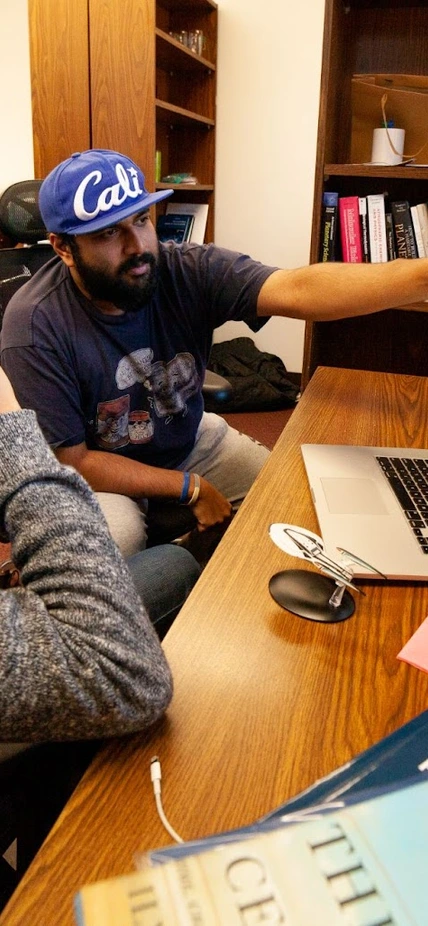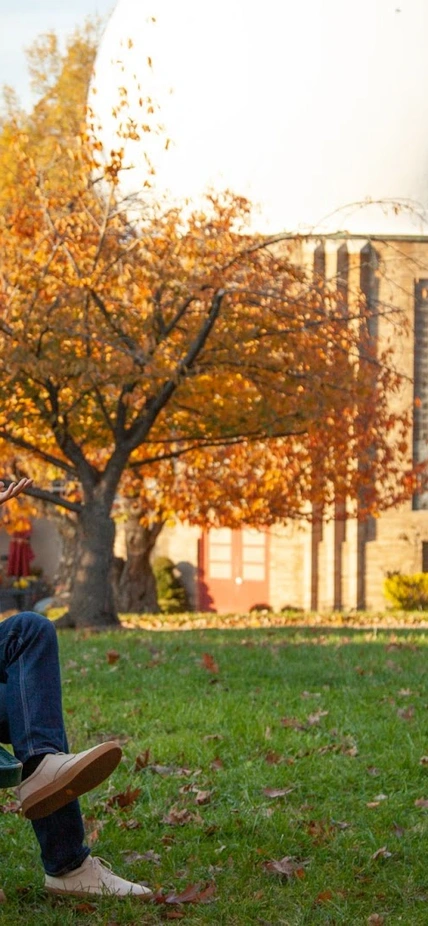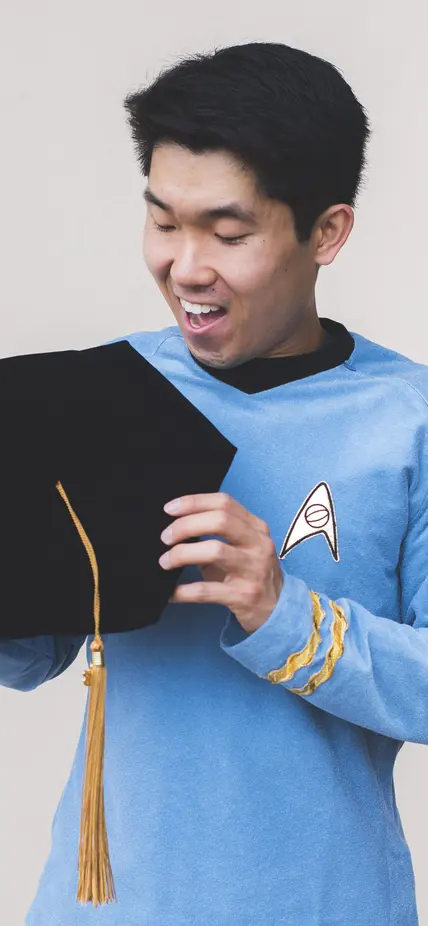Mike Wong, planetary scientist and astrobiologist, is looking for answers to some of humanity’s biggest mysteries. Wong first came to our campus 11 years ago as an intern in Alexander Goncharov’s high-pressure lab. Now he’s back as a Postdoctoral Fellow with the goal of furthering humanity’s understanding of how life develops on other worlds and how we can detect it. He works with Staff Scientist Bob Hazen to assess the Network Topologies of Exoplanet Atmospheres for Potential Biosignatures.
In this spotlight, Wong shares his recent research about Nitrogen on an ancient Mars; gives advice to future astrobiologists, and sets his sights on next year’s Mud Cup. He also shares how his love of science fiction inspired him to get into this field of study.
In addition to research, Wong is the producer of the podcast Strange New Worlds, which hosts conversations at the intersection between science and Star Trek. Definitely worth a listen!
Who are you, and what do you study?
Hello! My academic name is Michael L. Wong (which differentiates me from Michael H. Wong, who happens to also study planetary atmospheres), but if you ever see me in person, please just call me Mike.
I’m a planetary scientist and an astrobiologist. I use the chemistry of planetary atmospheres as a window into larger questions about life in the universe: What makes planets suitable for sustaining life? How does life emerge? And how can we detect life on faraway worlds? Answering these questions will profoundly affect our perspective of our place in the universe.
What would you say is the coolest thing about your work?
I love the fact that astrobiology is such an interdisciplinary subject. Just look at my meeting schedule for evidence! This week, I’m speaking with: a data scientist, a mineralogist, an organic chemist, a geobiologist, a theoretical physicist, several astronomers and planetary scientists, and hearing seminars from two oceanographers and a geneticist. The most fantastic part of my job is learning from all of these brilliant people and trying to put the pieces together to understand the possibilities for life in the universe.
What is the most challenging part of your work?
Coding, not gonna lie. I should’ve taken more computer science courses in school. Kids, take more computer science courses in school!
What are the larger implications of your research?
I believe that our generation has the capability to discover evidence of extraterrestrial life—if it’s out there and we push ourselves to find it. Being an astrobiologist means being part of an effort to give humanity the best shot at definitively detecting, interpreting, and reporting signs of life elsewhere. A major discovery in our field could completely change the way we view the universe, each other, and ourselves.
Exoplanets and astrobiology have been described as “gateway drugs” to other technical fields because these subjects excite the imagination and draw people to the sciences. I hope that through my efforts—as a scientist and as a science communicator—I will end up influencing many others to pursue the knowledge and wisdom that science has to offer.

Mike Wong and colleague Anirudh Prabhu discuss how to tweak the presentation of a network of Earth's atmospheric chemistry in their shared office on the Broad Branch Road campus. Photo courtesy Carnegie Institution for Science/Katy Cain
Do you have any recent projects you're excited about
I’m proud of a recently published study about nitrogen fixation (the conversion of N2 gas into more biologically accessible forms, like nitrate) on Mars when the planet was plausibly much warmer and wetter. This work was led by my mentee, Danica Adams, a graduate student at Caltech. Danica showed that a combination of solar energetic particles, ultraviolet photons, and lightning could fix enough nitrogen in Mars’s ancient atmosphere to match, within a factor of 2, the nitrate that the Curiosity rover measured in its drill sites.
How did you get into astrobiology?
It’s no secret that I’m a big fan of science fiction, especially Star Trek. The mission of the U.S.S. Enterprise is “to explore strange new worlds, to seek out new life and new civilizations.” I’m totally certain my scientific career is an outgrowth of these words.
I love the feedback loop between science and fiction. Early space science discoveries inspired writers to dream up stories that inspired me as a kid. I can only hope that some of my scientific work will go on to inspire the next round of stories, which will inspire the next round of scientists, and so on.
How has your background influenced your research?
People say that science fiction is at its best when it uses distant settings and wild adventures to comment on issues close to home. I think the same is true of astrobiology. When we seek what might be out there, we are forced to reflect on what we are. When we ask what makes other planets habitable, we become more attuned to how we are wrecking the only planet we can live on. When we think about exploring outer space, we are reminded of the harmful ways in which our ancestors explored the globe for greed and domination. We can’t look outward and toward the future without also looking inward at ourselves and our history on this planet. It’s a lovely paradox.
Do you remember the first time you thought you'd be a scientist?
Probably at whatever point I realized that actual scientists spend a lot more time doing science projects (very fun) than taking science exams (not nearly as fun).
What else has influenced your thinking as a scientist?
I try to recognize that everyone I meet has something to teach me, but to keep the list of influential people short, I will simply say that I am eternally grateful to my mentors from the previous stages of my career, including Dr. Burkhard Militzer (UC Berkeley), Dr. Yuk Yung (Caltech), Dr. Andy Ingersoll (Caltech), Dr. Mike Russell (formerly JPL), and Dr. Victoria Meadows (University of Washington).
Are you looking forward to any projects?
I think there are a lot of hidden gems waiting to be found—hidden truths about life that can be revealed through abstract approaches—that will help us with looking for extraterrestrial life, especially “life as we don’t know it.” In this vein, I’m looking forward to collaborating with Dr. Robert Hazen, Dr. Shaunna Morrison, and Dr. Anirudh Prabhu on applying network science to planetary and astrobiological questions.
One of the most thrilling things about exoplanet science is the diversity of planet types we now know exist, many of which we don’t have in our solar system. Hence, I’m also looking forward to working with Dr. Peter Gao and Dr. Anjali Piette, as well as the greater AEThER collaboration led by Dr. Anat Shahar, to study the habitability of exoplanets that are different from the Earth.
What's something about you that people might not know? Any hobbies? Interesting facts?
I spent 12 years total working on various yearbook staff in high school, college, and graduate school. I was pleased to discover that, despite not being a school, Carnegie does have a yearbook—published by a team of professional journalists!—and it is my top-secret mission to somehow infiltrate the staff.
Why did you choose Carnegie’s Earth and Planets Laboratory?
I have fond memories of being a Summer Scholar at Carnegie’s Geophysical Laboratory (before its merger with the Department of Terrestrial Magnetism into what is now the Earth & Planets Laboratory) when I worked with Dr. Alex Goncharov and Dr. Viktor Struzhkin on high-pressure experiments in 2010. I’m so grateful for the chance to return to Carnegie as a postdoc. It’s the perfect place to pursue the questions that mean the most to me.

Mike Wong poses in front of the campus’ iconic Atomic Physics Observatory. Photo courtesy Carnegie Institution for Science/Katy Cain
In addition to being an intellectually enriching environment, Carnegie provides such an welcoming, intimate community. People actually came up to me during my first week of work to tell me that they remember me from 11 years ago—me, a lowly intern! That tells you how close-knit this place is. One of them, Dr. Amol Karandikar, remembered that I play soccer…
...which brings me to the real reason why I came back: to win the Mud Cup. Over a decade has passed, but I can never forget the GL Pistons’ heartbreaking 3–4 loss to the DTM Dynamos in 2010, so I’m here to win back the trophy for the Pistons! (I’ve already failed once. Luckily, I have a two-year postdoc.)
Do you have any advice for current graduate students?
Getting into astrobiology can be difficult because of the lack of astrobiology coursework and research at most institutions. Two things helped me break into this burgeoning field when I was a graduate student: attending astrobiology-themed summer schools and starting an astrobiology reading group. If you find yourself eager to learn about something but don’t know where to begin, my advice is to apply for short workshops and summer schools, or gather a group of like-minded friends and have a blast teaching yourselves!
If you ever want to reach out with questions, I’m always happy to talk to future astrobiologists! You can email me at mwong@carnegiescience.edu.
Anything else you’d like to add?
In my spare time, I produce and host Strange New Worlds: A Science & Star Trek Podcast. You can also follow me on Twitter.
